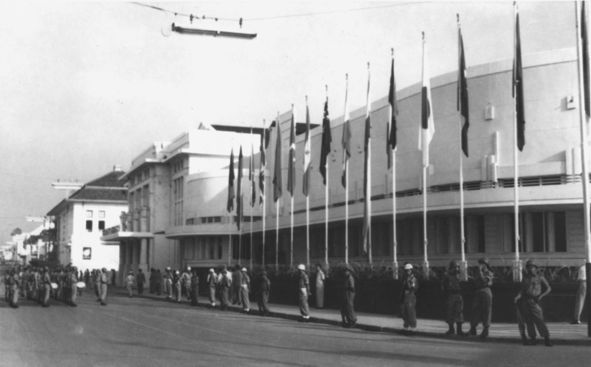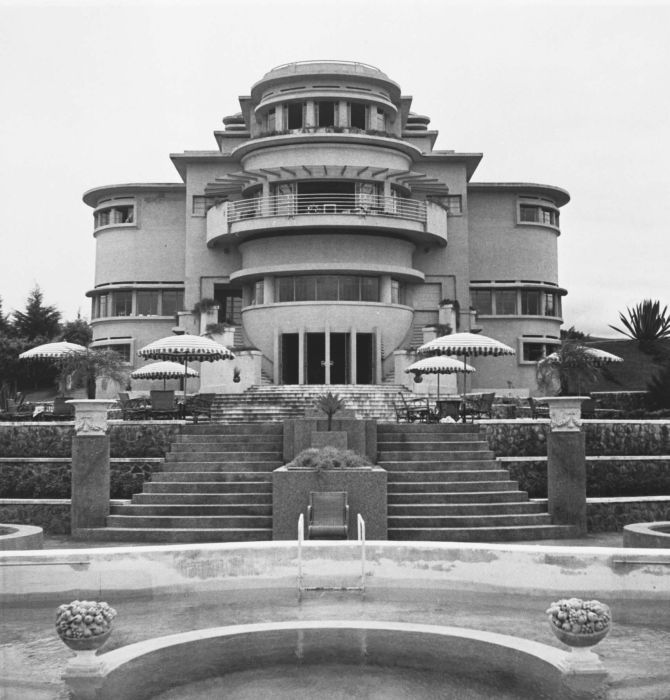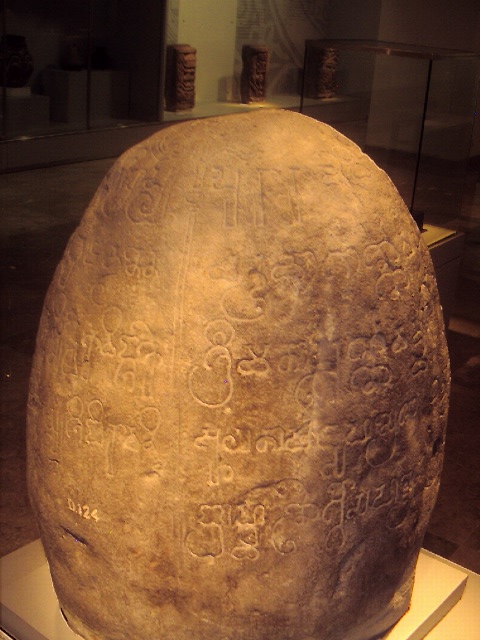|
Asian–African Conference
The first large-scale Asian–African or Afro–Asian Conference (), also known as the Bandung Conference, was a meeting of Asian and African states, most of which were newly independent, which took place on 18–24 April 1955 in Bandung, West Java, Indonesia. The twenty-nine countries that participated represented a total population of 1.5 billion people, 54% of the world's population. The conference was organized by Indonesia, Burma (Myanmar), India, Ceylon (Sri Lanka), and Pakistan and was coordinated by Ruslan Abdulgani, secretary general of the Ministry of Foreign Affairs of the Republic of Indonesia. The conference's stated aims were to promote Afro-Asian economic and cultural cooperation and to oppose colonialism or neocolonialism by any nation. The conference was a step towards the eventual creation of the Non-Aligned Movement (NAM) yet the two initiatives ran in parallel during the 1960s, even coming in confrontation with one another prior to the 2nd Cairo NAM Con ... [...More Info...] [...Related Items...] OR: [Wikipedia] [Google] [Baidu] |
Bandung
Bandung is the capital city of the West Java province of Indonesia. Located on the island of Java, the city is the List of Indonesian cities by population, fourth-most populous city and fourth largest city in Indonesia after Jakarta, Surabaya, and Medan. Greater Bandung (Bandung Basin Metropolitan Area / BBMA) is the country's second-largest and second most populous List of metropolitan areas in Indonesia, metropolitan area, with over 11 million inhabitants. Situated above sea level (the highest point in the North area is at an altitude of , and the lowest in the South at above sea level), approximately southeast of Jakarta, Bandung has cooler year-round temperatures than most other List of cities in Indonesia, Indonesian cities. The city lies in a river basin surrounded by volcanic mountains that provide a natural defense system, which was the primary reason for the Dutch East Indies government's plan to move the capital from Batavia (modern-day Jakarta) to Bandung. The D ... [...More Info...] [...Related Items...] OR: [Wikipedia] [Google] [Baidu] |
Belgrade
Belgrade is the Capital city, capital and List of cities in Serbia, largest city of Serbia. It is located at the confluence of the Sava and Danube rivers and at the crossroads of the Pannonian Basin, Pannonian Plain and the Balkan Peninsula. The population of the Belgrade metropolitan area is 1,685,563 according to the 2022 census. It is one of the Balkans#Urbanization, major cities of Southeast Europe and the List of cities and towns on the river Danube, third-most populous city on the river Danube. Belgrade is one of the List of oldest continuously inhabited cities, oldest continuously inhabited cities in Europe and the world. One of the most important prehistoric cultures of Europe, the Vinča culture, evolved within the Belgrade area in the 6th millennium BC. In antiquity, Thracians, Thraco-Dacians inhabited the region and, after 279 BC, Celts settled the city, naming it ''Singidunum, Singidūn''. It was Roman Serbia, conquered by the Romans under the reign of Augustus and ... [...More Info...] [...Related Items...] OR: [Wikipedia] [Google] [Baidu] |
Bogor
Bogor City (), or Bogor (, ), is a landlocked city in the West Java, Indonesia. Located around south of the national capital of Jakarta, Bogor is the 6th largest city in the Jakarta metropolitan area and the 14th overall nationwide. Estimasi Penduduk Menurut Umur Tunggal Dan Jenis Kelamin 2014 Kementerian Kesehatan The city covers an area of 111.39 km2, and it had a population of 950,334 at the 2010 CensusBiro Pusat Statistik, Jakarta, 2011. and 1,043,070 at the 2020 Census.Badan Pusat Statistik, Jakarta, 2021. The official population estimate as at the end of 2023 was 1,127,408. Bogor is an important center of economy, science, cultural heritage and tourism in Indonesia because this city is a mount ... [...More Info...] [...Related Items...] OR: [Wikipedia] [Google] [Baidu] |
The Chinese Historical Review
''The Chinese Historical Review'' is a biannual peer-reviewed academic journal published by Taylor & Francis on behalf of Chinese Historians in the United States. The journal publishes original research on the history of China in every period, China's historical relations with the world, the historical experiences of the overseas Chinese, as well as comparative and transnational studies of history and social sciences. The journal was established in 1987 as ''The Historians'' and renamed ''The Chinese Historians'' in 1989, obtaining its current name in 2004. The editor-in-chief is Xiaobing Li (University of Central Oklahoma). The journal is abstracted and indexed by Bibliography of Asian Studies and Scopus Scopus is a scientific abstract and citation database, launched by the academic publisher Elsevier as a competitor to older Web of Science in 2004. The ensuing competition between the two databases has been characterized as "intense" and is c .... The journal has an impa ... [...More Info...] [...Related Items...] OR: [Wikipedia] [Google] [Baidu] |
Cold War History (journal)
''Cold War History'' is a quarterly peer-reviewed academic journal covering the history of the Cold War. It was established in 2000 and is published by Routledge. The Managing Editors are Harriet Solomon (London School of Economics and Political Science) and Mina Rigby-Thompson (University of London). The journal is abstracted and indexed in America: History and Life, CSA Worldwide Political Science Abstracts, Historical Abstracts, International Bibliography of the Social Sciences, Arts & Humanities Citation Index, and the Social Sciences Citation Index. According to the ''Journal Citation Reports'', the journal has a 2014 impact factor The impact factor (IF) or journal impact factor (JIF) of an academic journal is a type of journal ranking. Journals with higher impact factor values are considered more prestigious or important within their field. The Impact Factor of a journa ... of 0.357. References External links * English-language journals Quarterly journals ... [...More Info...] [...Related Items...] OR: [Wikipedia] [Google] [Baidu] |
Zhou Enlai
Zhou Enlai ( zh, s=周恩来, p=Zhōu Ēnlái, w=Chou1 Ên1-lai2; 5 March 1898 – 8 January 1976) was a Chinese statesman, diplomat, and revolutionary who served as the first Premier of the People's Republic of China from September 1954 until Death of Zhou Enlai, his death in January 1976. Zhou served under Chairman Mao Zedong and aided the Chinese Communist Party, Communist Party in rising to power, later helping consolidate its control, form its Foreign policy of China, foreign policy, and develop the Economy of China, Chinese economy. As a diplomat, Zhou served as the Chinese Foreign Minister of the People's Republic of China, foreign minister from 1949 to 1958. Advocating peaceful coexistence with Western Bloc, the West after the Korean War, he participated in the 1954 Geneva Conference and the 1955 Bandung Conference and helped orchestrate 1972 Nixon visit to China, Richard Nixon's 1972 visit to China. He helped devise policies regarding disputes with the United States, ... [...More Info...] [...Related Items...] OR: [Wikipedia] [Google] [Baidu] |
Premier Of China
The premier of China, officially the Premier of the State Council of the People's Republic of China, is the head of government of the People's Republic of China (PRC) and leader of the State Council. This post was established in 1911 near the end of the Qing dynasty, but the current post dates to 1954, five years after the establishment of the PRC. The premier is the third-highest ranking official in China's political system after the general secretary of the Chinese Communist Party ( party leader) and the president ( state representative), and holds the highest rank in the civil service of the central government. The premier presides over the plenary and executive meetings of the State Council, and assumes overall leadership over the State Council's work. The premier also signs administrative regulations passed by the State Council and signs the orders approving the appointment and removal of deputy-ministerial level officials of the State Council, as well as chief executi ... [...More Info...] [...Related Items...] OR: [Wikipedia] [Google] [Baidu] |
Chinese Communist Party
The Communist Party of China (CPC), also translated into English as Chinese Communist Party (CCP), is the founding and One-party state, sole ruling party of the People's Republic of China (PRC). Founded in 1921, the CCP emerged victorious in the Chinese Civil War against the Kuomintang and Proclamation of the People's Republic of China, proclaimed the establishment of the PRC under the leadership of Mao Zedong in October 1949. Since then, the CCP has governed China and has had sole control over the People's Liberation Army (PLA). , the CCP has more than 99 million members, making it the List of largest political parties, second largest political party by membership in the world. In 1921, Chen Duxiu and Li Dazhao led the founding of the CCP with the help of the Far Eastern Bureau of the Communist Party of the Soviet Union, Russian Communist Party (Bolsheviks) and Far Eastern Bureau of the Communist International. Although the CCP aligned with the Kuomintang (KMT) during its initia ... [...More Info...] [...Related Items...] OR: [Wikipedia] [Google] [Baidu] |
Mao Zedong
Mao Zedong pronounced ; traditionally Romanization of Chinese, romanised as Mao Tse-tung. (26December 18939September 1976) was a Chinese politician, revolutionary, and political theorist who founded the People's Republic of China (PRC) in 1949 and led the country from Proclamation of the People's Republic of China, its establishment until Death and state funeral of Mao Zedong, his death in 1976. Mao served as Chairman of the Chinese Communist Party (CCP) from 1943 until his death, and as the party's ''de facto'' leader from 1935. His theories, which he advocated as a Chinese adaptation of Marxism–Leninism, are known as Maoism. Born to a peasant family in Shaoshan, Hunan, Mao studied in Changsha and was influenced by the 1911 Revolution and ideas of Chinese nationalism and anti-imperialism. He was introduced to Marxism while working as a librarian at Peking University, and later participated in the May Fourth Movement of 1919. In 1921, Mao became a founding member of the ... [...More Info...] [...Related Items...] OR: [Wikipedia] [Google] [Baidu] |
Chairman Of The Chinese Communist Party
The chairman of the Central Committee of the Chinese Communist Party ( zh, s=中国共产党中央委员会主席, p=Zhōngguó Gòngchǎndǎng Zhōngyāng Wěiyuánhuì Zhǔxí) was the party leader, leader of the Chinese Communist Party. The position was established at the 8th National Congress of the Chinese Communist Party, 8th National Congress in 1945 and abolished at the 12th National Congress of the Chinese Communist Party, 12th National Congress in 1982, being replaced by the General Secretary of the Chinese Communist Party, general secretary. Offices with the name Chairman of the Central Executive Committee and Chairman of the Central Committee existed in 1922–1923 and 1928–1931, respectively. History Background Following the establishment of the CCP, its inaugural leader, Chen Duxiu, held various positions including secretary of the Central Bureau, chairman of the Central Executive Committee ( zh, c=中央执行委员会委员长), and general secretary of the C ... [...More Info...] [...Related Items...] OR: [Wikipedia] [Google] [Baidu] |
Decolonization
Decolonization is the undoing of colonialism, the latter being the process whereby Imperialism, imperial nations establish and dominate foreign territories, often overseas. The meanings and applications of the term are disputed. Some scholars of decolonization focus especially on Separatism, independence movements in the Colony, colonies and the collapse of global colonial empires. As a movement to establish independence for colonized territories from their respective Metropole, metropoles, decolonization began in 1775 in American Revolution, North America. Major waves of decolonization occurred in the aftermath of the First World War and most prominently after the Second World War. Critical scholars extend the meaning beyond independence or equal rights for colonized peoples to include broader economic, cultural and psychological aspects of the colonial experience. Extending the meaning of decolonization beyond political independence has been disputed and received criticis ... [...More Info...] [...Related Items...] OR: [Wikipedia] [Google] [Baidu] |
New Delhi
New Delhi (; ) is the Capital city, capital of India and a part of the Delhi, National Capital Territory of Delhi (NCT). New Delhi is the seat of all three branches of the Government of India, hosting the Rashtrapati Bhavan, New Parliament House, New Delhi, Sansad Bhavan, and the Supreme Court of India, Supreme Court. New Delhi is a Municipal governance in India, municipality within the NCT, administered by the New Delhi Municipal Council (NDMC), which covers mostly Lutyens' Delhi and a few adjacent areas. The municipal area is part of a larger List of districts in India, administrative district, the New Delhi district. Although colloquially ''Delhi'' and ''New Delhi'' are used interchangeably to refer to the National Capital Territory of Delhi, both are distinct entities, with the municipality and the New Delhi district forming a relatively small part within the megacity of Delhi. The National Capital Region (India), National Capital Region is an even larger entity, compris ... [...More Info...] [...Related Items...] OR: [Wikipedia] [Google] [Baidu] |









